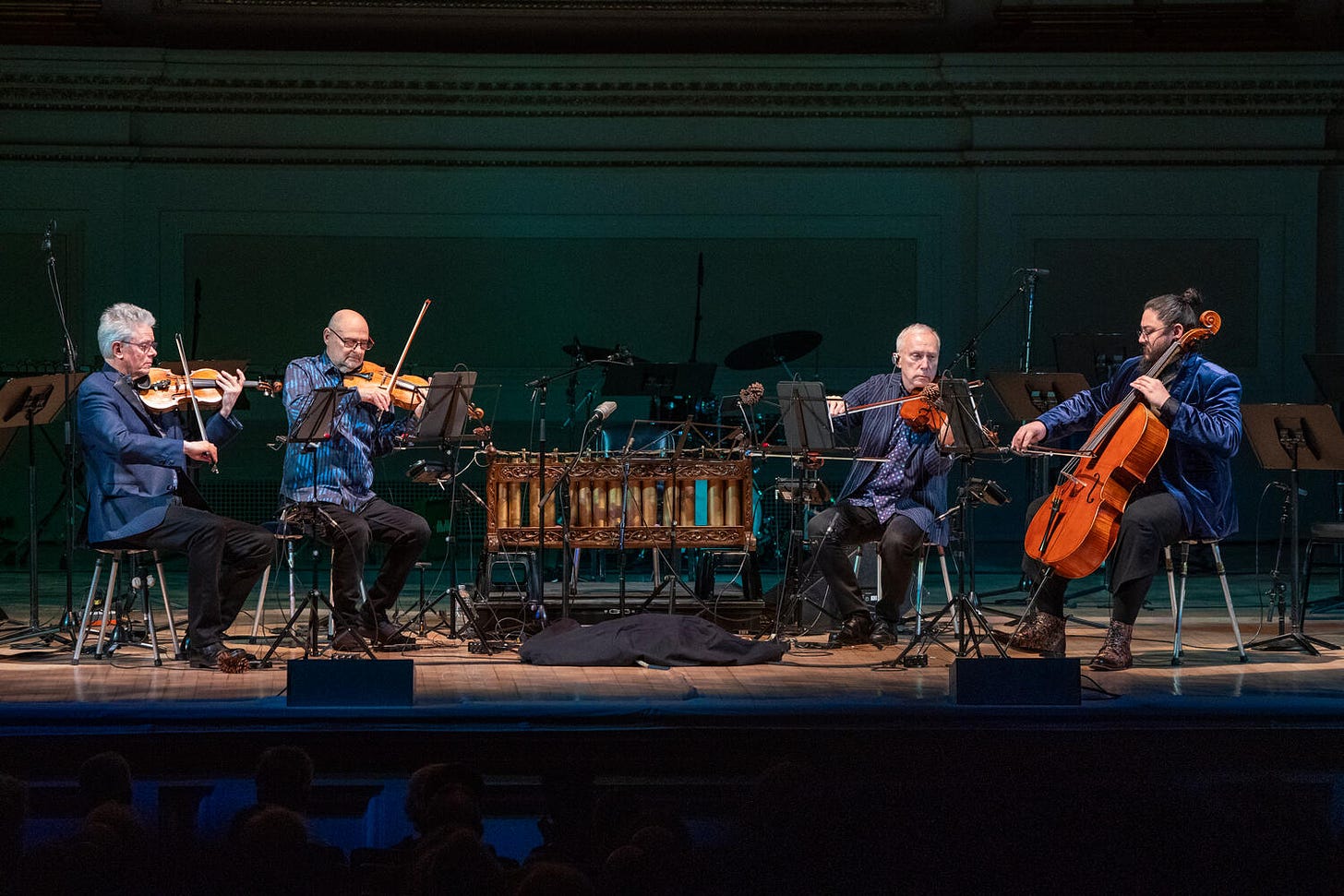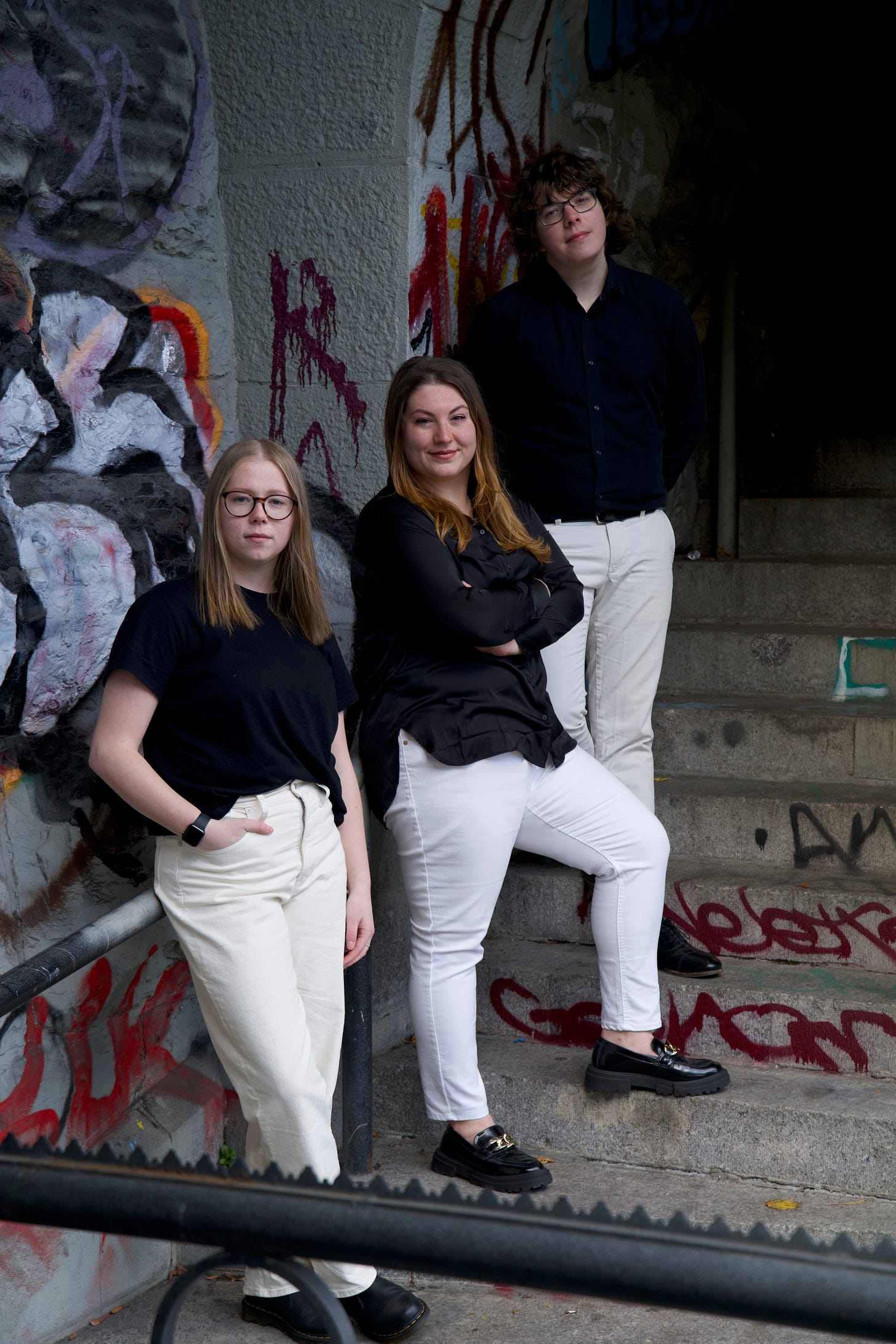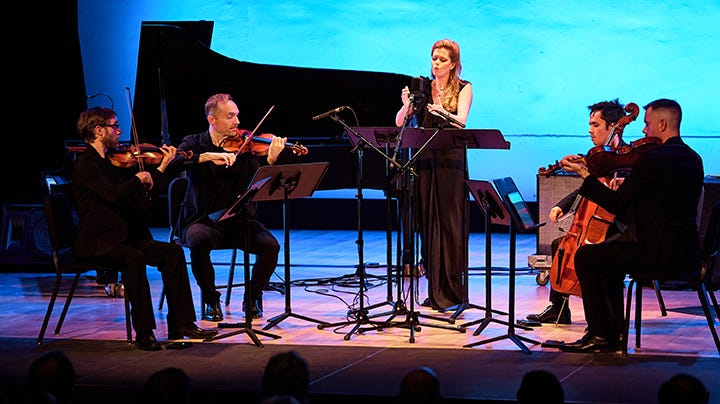Happy holidays! I hope your Thanksgiving was as tasty as mine was.
I spent much of this month’s mental energy on an upcoming feature article for Chamber Music Magazine. I’ve been writing a lot of features in the last couple years, and they’re strange beasts. They make me so, so anxious — as anyone who’s seen me in the last month can attest — but there’s something rewarding about really digging into a person, or event, or concept. Besides which, those moments where a subject says, “Wow, you really get me,” are my crack.

For this feature, I conducted about a dozen interviews ranging from fifteen minutes to two hours, and in the end, I probably spent more time mining the recordings for quotes than I did putting words on the page. Tidying up AI interview transcriptions is a tedious process, and few things make me squirm more than my own recorded speaking voice. I’m not sure how I’d rather it sound. Deeper? Sexier? Less mucus-y?
Thanks to a badly timed head cold, this particular batch of interviews sounded particularly congested, as I grumbled to a few musical minds over steeply priced post-concert beers a couple weeks ago. Everyone hates their own voice, said Ben Gambuzza of The Best is Noise (and The Village Voice), but as a radio personality, he had to get over it quickly. Emma Hoffman of Parterre Box made a passing reference to Jacques Lacan and the mirror stage — apt, I realized after she explained it.
But this month, I didn’t just wince at the records of my fierce post-nasal drip. This feature granted me phone calls with bigger names than I ever hoped to encounter at the ripe old age of almost-25, and after three weeks of listening to my own interview babble, I’m about ready to crawl into a hole. Sure, I go in with my tidy little list of questions, but how do you respond when, in the 90th minute, your subject drops an offhand comment so insightful, so powerful that you nearly cry? Or when an American forefather takes 20 minutes out of his crisp Tokyo morning to chronicle that time he, oh, invented minimalism? (Two separate interviews, each life-changing.)
My defaults: “Awesome.” “Fantastic.” “Amazing.” Occasionally a “Wow.” Dumbfounded. Star-struck. No further questions, your excellency, lest I enter a fugue state and vomit some garbled follow-up in your face. Famous people are scary, even the nice ones!
I hope some of those jitters fade with experience, though I’ll gladly cling to the holy-shit feeling when a Pulitzer winner’s phone number hits my inbox. At this point, I’m speaking to people who I’ve been listening to since high school, or sometimes earlier, and that’s a pinch-me honor in itself. When relevant, I’ll tell my subjects as much. At best, that comment makes someone’s day. At worst, it makes them feel old, or it loses me some cred as a serious, austere journalist — but nothing they think could be harsher than my imposter syndrome!
What I’ve Seen
Lutenist Thomas Dunford and mezzo-soprano Lea Desandre’s (almost) all-Italian Carnegie recital debut (November 2). Last Thomas Dunford gush for a while, I promise, but this mushy concert, full of love at its tenderest and most carnal, was just too fabulous to leave out. Dunford and Desandre, newlyweds and longtime recital partners, share a magical way with recitative. The program’s namesake “Lettera amorosa,” a fiery monody from one of Monteverdi’s later madrigal volumes, yearned and ached with the text’s passionate flairs. Other highlights included the duo’s gaunt interpretation of a Virgin Mary-and-Jesus lullaby by Tarquinio Merula — whose haunting accompaniment resolves for the first time in minute six of seven — and a fleet, pyrotechnical finale of Monteverdi’s less-angsty “Quel sguardo sdegnosetto.” For one of their encores, Dunford tried to teach a singalong of François Hardy’s “Le temps de l’amour,” presumably well known to French audiences. It was very charming, and though the Carnegie geriatrics and I didn’t quite catch the lyrics the first time, it’s been stuck in my head since.

Kronos Quartet’s 50th anniversary celebration at Carnegie Hall (November 3). For reasons vaguely alluded to above, I tumbled down the Kronos rabbit hole this month. For an ensemble so storied celebrating such a huge milestone (with three of four first-decade members intact), Kronos really didn’t make their celebration about themselves — most of the concert’s dozen-plus works called on collaborators old and new, sometimes just one, sometimes nearly 50. I’ll keep this blurb brief (don’t want to sell my editor rotten apples), but suffice it to say the evening was electric, the kind of show that reminds you just how much freedom and joy exists in the all-too-serious world of classical music.
Dice Trio’s all-premiere tour sendoff concert at Manhattan School of Music (November 8). At Manhattan School of Music’s Contemporary Performance Program, a hotbed for NYC’s future new music beacons since its 2007 inception, there’s a precedent of ensembles who buck standard instrumentations, instead building their own bespoke repertoires from the ground up. Dice Trio are the latest heirs to that lineage, and as the saxes-flutes-and-trumpet trio finishes their masters’ degrees, their momentum is building fast. I’m enjoying my front row seat to the ensemble’s early successes — bestie privilege! (Teehee hi Sam!) What Dice purveys lies at the border between music and theater, a gripping mix of text, gesture, and technicolor extended technique whose balance adjusts for each piece they commission. In one of their seven November premieres, soprano, composer, and collaborator Yue Chen appeared as a Pierrot-ish clown, investigating pages of sheet music hanging from a makeshift mobile; another one, by Emily Green, included an unexpected 19-tone equal temperament reference to Bach’s early Actus Tragicus cantata. I acknowledge my biases, but Dice Trio have struck a vanishingly rare balance of stage presence and virtuosity that I fully believe poises them to become the next big thing in New York’s avant-garde scene.
Heartbeat Opera’s drag extravaganza The Golden Cock at Roulette (November 11). Ever want to see someone fist a rotisserie chicken onstage? Neither did I, but as emcee Maxim Ibadov thrust their hand into a Costco-looking bird, I couldn’t help but giggle. That sort of outlandish, absurd silliness formed the tone of this yearly tradition from Heartbeat Opera, monarchs of NYC’s scrappy indie opera scene. This season, Heartbeat jabbed at the Russian oligarchy with a loose take on Rimsky-Korsakov’s The Golden Cockerel. In the end, the show wasn’t really about the singing, though there was plenty of lovely voice to go around, particularly in soprano Ariana Wehr’s acrobatic “Ombra leggiera,” a Callas favorite from Meyerbeer’s Dinorah. Rather, this was a show that focused on maximalist, delightfully brash outfits (by David Quinn, aided by five[!] stitchers), cheeky gags, and making sure the audience had a rip-roaring good time. That, we did, as my fifth-grade-teacher companion and I agreed — if you can impress a middle-school teacher on a Friday night, you’re probably doing something right. I probably could have used another drink or two, but any drunker and I would have missed the references in arranger-pianist Dan Schlosberg’s masterful pastiche-overture, which brought me straight back to the ranks of my youth orchestra cello section. (As I overheard a fellow audience member say so deftly after the show, those common-tone modulations!!!)
Sir Bryn Terfel’s recital at Carnegie Hall (November 14). It was a schlocky program of Sir Bryn’s greatest hits, but in a rare U.S. appearance, the Welsh bass-baritone was very charismatic, even when bark-shouting his high notes. He didn’t weave the long phrases I crave on Schubert or Schumann, but in his rendition of Finzi’s Let Us Garlands Bring (reportedly the first song cycle he ever learned), I forgot my grievances amid the full heft of his gorgeous mid-low range. Speaking of forgetting: Sir Bryn did not have the greatest go of the evening’s lyrics, often inadvertently swapping his verses. Mistakes happen, and I’m sure the nerves of facing a full Carnegie Hall don’t help, but it felt like cause for genuine concern — the guy is only 58! Still, a lovely evening from the world’s reigning goyishe Tevye, who naturally brandished a final encore of “If I Were a Rich Man” for the decidedly un-goyishe crowd. Former Royal Harpist (and current Terfel wife) Hannah Stone’s solo interludes were also among the evening’s hits, her melodies carefully carved out of arpeggiated flurries.
Barbara Hannigan’s all-Zorn program at Miller Theatre (November 16). John Zorn writes for a small-ish, mighty cadre of musicians whose superhuman technique never limits his unfettered ideas. And yeah, when you have a soprano like Barbara Hannigan at your disposal, you can start phrases with pianississimo high B’s over and over, because she can do anything — it almost feels like cheating. But that didn’t change the utter delight of Hannigan’s voice, which shape-shifted to every facet of Zorn’s compositions, the platonic definition of the word “polystylistic.” The composer is a charmingly terrible emcee, almost relishing in his unrehearsed non-speeches, but he dotes on his players as only a peak Jewish grandpa could. And as a final treat to Zorn’s 70th birthday Miller Theatre series, a peek into the teenage Zorn’s mind with the art song “NAZDAR, POUPON, NAZDAR,” which premiered that night a full 54 years after it was written. (For more astute insights, I commend you to the Parterre Box review of the aforementioned Emma Hoffman.)
Ghost Train Orchestra’s Moondog album release show (November 18). Frankly, a letdown release show for a fabulous album (recommended in my previous missive), dedicated to the composer and Midtown Manhattan street performer who influenced the first school of American minimalists. The ensemble severely lacked in energy through the first half; only once they transitioned away from Moondog and into a zippy chart from trombonist-guitarist Curtis Hasselbring did they gain some verve. An eleventh-hour cameo from The Talking Heads’ David Byrne — “dressed in all white as if playing God in a high school play,” a friend mused — continued to build much-needed zest. Byrne utterly failed to count the quick fives of Moondog’s “Be a Hobo” — as the other two out-of-tune vocalists had done with many complex meters throughout the night — but his vibes were impeccable. All that said, watching percussionist David Cossin (of the Bang on a Can All Stars) coax his cajón for color after unique color was an education in itself.
What I’ve Listened To
For the rare all-star ensemble that equals the sum of its parts: Sinfonia of London’s Daphnis and Chloe (Chandos, 2023). It’s a common fallacy that the best players necessarily make the best ensemble (I won’t name names) but the Sinfonia of London, cherrypicked from the city’s orchestras and studios, consistently churns out four stellar (and varied) albums a year. See also: their recent recording of Rodgers & Hammerstein’s Oklahoma! in its original orchestration.
For a canon favorite refracted through a jazz lens: Sylvie Courvoisier and Cory Smythe’s four-hands Rite of Spring (Pyroclastic, 2023). Their Rite highlights polyphony I never knew existed, and Courvoisier’s half-hour response, “Spectre d’un songe,” is fascinating.
For a Baroque Christmas devoid of Bach: Ensemble Correspondances’ recording of Charpentier’s Messe de minuit, among other nativity delights (Harmonia Mundi, 2023). I listen to a lot of French Baroque music, and Correspondances’ recordings are the ones I reach for over and over.
For the Central Asian bangers you didn’t know you needed: Rainbow (Music of Central Asia Vol. 8, Smithsonian Folkways, 2010), a joint venture between the Kronos Quartet and master musicians from Azerbaijan and Afghanistan. This is one of the deepest cuts I reached on my Kronos dive, and it also turned out to be my favorite.
For a song maven’s 100th recording, just as fresh as the first: Carolyn Sampson and Joseph Middleton’s but I like to sing… (BIS, 2023) This is Sampson’s fourth recital album in 2023 alone, and the effortlessness with which she glides from Schubert to Strauss to Saariaho puts the singers releasing one disc a year to shame. This launched me on a Sampson/Middleton song bender, and whether French, German, or English, you can’t go wrong .
For a new favorite account of a piece you’re tired of: a period-instrument recording of Robert Schumann’s piano quartet and quintet from Isabelle Faust, Anne Katharina Schreiber, Antoine Tamestit, Jean-Guihen Queyras, and Alexander Melnikov (Harmonia Mundi, 2023). On gut strings, there’s more warm bloom to the pieces’ slow bits, which contrasts perfectly to the slight clickety-clack of sweeping runs on a mid-19th-century fortepiano.
For proof that trio sonatas are not a dime a dozen: Le Consort’s Philarmonica (Alpha Classics, 2023). Along with Purcell and Matteis, the hotshot quartet takes a dive into the chamber music of the anonymous “Mrs. Philharmonica,” known only from a dozen trio sonatas published in 1715.
What’s Coming Up
Apologies for the huge gap around Christmas — that’s what we singers know as “gig hell.” Fifty bucks is fifty bucks.
Met Opera: Florencia en el Amazonas
Sat Dec 2 and 9 (both matinees)
Tue Dec 5
Thu Dec 14
The Metropolitan Opera House
Met Opera: X
Sat Dec 2 (closing)
The Metropolitan Opera House
Parlando: Melodrama
Sun Dec 3 | Merkin Hall, Kaufman Music Center
Theotokos presents Cantatas: Yesterday and Today (pay what you will)
Thu Dec 7 | St. Mary’s Roman Catholic Church
Carols by Candlelight: The Advent Concert
Fri-Sat Dec 8 and 9 | Fifth Avenue Presbyterian Church
(Who among you dares to come hear me sing?)
Miller Theatre: Tallis Scholars 50th Anniversary
Sat Dec 9 | Church of St. Mary the Virgin
Sylvie Courvoisier & Mary Halvorson
Sat Dec 9 (two sets) | The Jazz Gallery
Ekmeles: The Little Match Girl Passion
Fri, Mon, Tues Dec 8, 11, 12 (two shows) | Church of the Intercession
Windborne: Music of Midwinter
Fri Dec 15 | St. John’s Lutheran Church
Music Before 1800: Winter Wassail
Sun Dec 17 (matinee) | The Riverside Church
American Modern Opera Company — El Niño: Nativity Reconsidered
Fri Dec 22 | Cathedral Church of St. John the Divine
Met Opera: Nabucco
reopens Fri Dec 29 | Metropolitan Opera House
Clarion Society: Vigil for Peace
Sun Dec 31 and Mon Jan 1 (both early evening) | Holy Trinity Cathedral
Doug Balliett: Gawain and the Green Knight
Sun Dec 31 | St. Mary’s Roman Catholic Church, Grand Street







I loved this read!